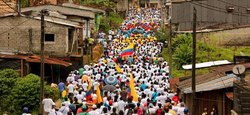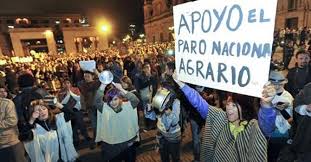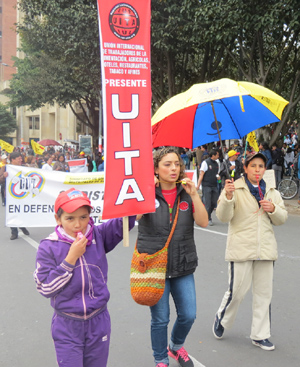IUF | 5 September 2013
Colombian workers and farmers take on global neoliberalism
Free trade chickens have come home to roost in Colombia, where urban workers and trade unions are supporting the strike by hundreds of thousands of small farmers devastated by recent trade agreements with the US and other countries. The wave of strikes and demonstrations is not only the most significant social movement in decades in that country. It is currently the most broadly based challenge to the global neo-liberal project. At a moment when new trade and investment treaties like the Trans Pacific Partnership Agreement (TPPA) are being readied under conditions of strict secrecy, it has much to teach us. And it needs global support.

Poultry, dairy, rice, potato, coffee and other farm producers have been joined by other groups - truckers protesting high fuel prices, health workers struggling with privatization, miners protesting the giveaway of the country's mineral resources, teachers, each with their own demands but united in their support for the rural revolt. The national center CUT and other unions have been crucial in mobilizing wide support.
The trade agreement with the United States, which went into effect last year, immediately abolished tariffs on 70% of agricultural imports and phases them out for remaining products. The predictable result has been a flood of cheap imports, many of them benefiting from direct and hidden subsidies. The impact on livelihoods has been immediate and severe.
 The response by President Santos has been, first, to deny that the protests were taking place (while using violence against protestors), then to falsely blame the movement on the guerrillas. Repression escalated, and on August 25, police in Bogota arrested Hubert de Jesús Ballesteros Gómez, a member of the CUT Executive and one of the union leaders designated to negotiate with the government. He remains in detention. Santos then stated he was willing to negotiate the movement's demands, on condition that the strikes and protests stopped. Finally, he agreed to negotiations based on alleged treaty safeguards, but the talks remain deadlocked.
The response by President Santos has been, first, to deny that the protests were taking place (while using violence against protestors), then to falsely blame the movement on the guerrillas. Repression escalated, and on August 25, police in Bogota arrested Hubert de Jesús Ballesteros Gómez, a member of the CUT Executive and one of the union leaders designated to negotiate with the government. He remains in detention. Santos then stated he was willing to negotiate the movement's demands, on condition that the strikes and protests stopped. Finally, he agreed to negotiations based on alleged treaty safeguards, but the talks remain deadlocked.
Under the terms of the treaty, such safeguards don't exist.
The treaty specifically prohibits Colombia to use the variable tariffs formerly allowed, under which tariffs could rise as import prices declined. Temporary measures in response to sudden changes in the quantity of goods are permitted, but only on those imports which are not already subject to duty-free entry. Colombian producers have no defense against the price volatility which is destroying their livelihoods. Even the very limited agricultural safeguard mechanisms currently allowed under WTO rules are excluded from the US-Colombia treaty - a prime example of how successive trade and investment agreements layer on levels of restrictions to restrict national policy space and strengthen corporate power.
Price volatility is not the only element in this assault on food security and rural incomes. Financial speculation, soaring land prices and the government crackdown against "unregistered" (i.e. unpatented) seeds are all part of the picture.
 Trade unionists, peasant activists and civil liberties defenders continue to be murdered with impunity despite the "safeguards" tacked on to the trade deals with the US and European Union. In July, Colombia's ambassador to the US resigned in connection with his alleged role in transferring land owned by smallholders to giant corporations through shell companies registered abroad. Among the companies involved were US-based Cargill, Riopaila Castilla, Colombia's largest sugar producer and a financial firm belonging to the billionaire owner of Colombia's largest newspaper, a close friend of President Santos. Undermining food security is a joint venture of Colombian and foreign investors.
Trade unionists, peasant activists and civil liberties defenders continue to be murdered with impunity despite the "safeguards" tacked on to the trade deals with the US and European Union. In July, Colombia's ambassador to the US resigned in connection with his alleged role in transferring land owned by smallholders to giant corporations through shell companies registered abroad. Among the companies involved were US-based Cargill, Riopaila Castilla, Colombia's largest sugar producer and a financial firm belonging to the billionaire owner of Colombia's largest newspaper, a close friend of President Santos. Undermining food security is a joint venture of Colombian and foreign investors.
Under the slogan "We are all small farmers", the movement is demanding the trade agreements be renegotiated or scrapped. Unions around the world should support this demand - and integrate the lessons of Colombia into the struggle to defeat the TPPA and similar anti-democratic investment agreements.
Updates on the movement in Colombia are posted regularly on the website of the IUF Regional Organization for Latin America












